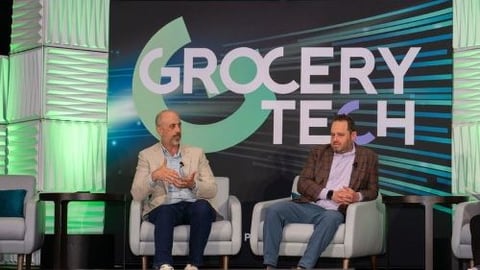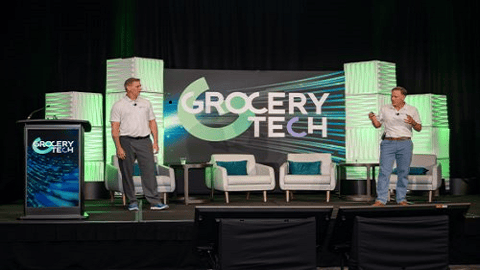Food Lion Exec Spills Secrets of Attracting Top Talent
Recruiting and keeping the best employees have always been concerns in grocery, but the rise of technology and different demographics’ varying attitudes toward work have made this endeavor more challenging than ever. To help attendees of Progressive Grocer’s recent GroceryTech event in Dallas get a handle on their own hiring approaches, Food Lion Talent Acquisition Manager Jessica Griffin sat down for a one-on-one chat with PG Editorial Director and Associate Publisher Gina Acosta.
A key point for retailers to understand, according to Griffin, is that “your future associates are your current customers, and vice versa.”
That means communicating with them in ways beyond telephones and email – text messaging, digital interviewing and ads on social media platforms like Instagram, for example. “How can we make it easy for the associates, for the future candidate … [to help] them understand that there is a career within Food Lion?” mused Griffin. “I think that's the biggest thing with omnichannel, just understanding where these people will be or are, and attracting them in those different ways.”
Asked to characterize the current labor market, Griffin noted that it was “very different than it was 10 years ago, or even five years ago. People are looking for convenience, but they’re also looking for stability. I was doing some reading the other week, and I was looking for, what are the people looking for? Is it salary? Millennials, we look for salary – where’s the money? Gen Z is not the same. They’re looking for stability. They’re looking for a home; they need the feedback.”
When it comes to grocery hiring in particular, Griffin emphasized the importance of highlighting the opportunities that exist in the industry, noting the value of “being able to get in front of that customer and helping them understand, ‘Hey, your daughter worked here at 16 and [she could] be here again, working in the corporate world at 26.’” She agreed with Acosta’s assertion that “grocery retailers really need to do a better job of stressing that opportunity.”
[RELATED: 3 Retail Recruiting Trends for 2025]
Having come from the fast-paced tech world to work at Food Lion, Griffin recognized that she needed to update and accelerate the company’s hiring process to get people into open positions as soon as possible.
“We’ve implemented an interview strategy,” she explained. “So you’ll have that conversation with the first person and they’re capturing that data to understand what you like, what you’re interested in, and then you’ll go through a second interview with that store manager or CSM, and they’ll assess you for the talent that you have, and then we hire you. But everybody will go through that same interview process to assess talent, and then that way, you’ll know who you have in your store. … And that leader is supposed to communicate that to us to start to build those succession plans. Corporate is the same thing. Everybody’s following the same interview process. … That has helped us in getting some great people. I think our turnover rate when I started was like 88%. We’re down to like 67% right now.”
As far as interviewing candidates goes, “everybody is assessed on the same pole, and I think doing it that way and keeping the interview process short [works],” she observed. “I think some of our roles, you might get five or seven interviews. That’s crazy, right? Let’s just keep it at three for the entire business. Whether you’re going from a bagger to a VP, I think everyone needs that same experience.”
Griffin likewise accelerated the offer process for those already hired. “When I started, [the hiree] had to find a printer, sign [the offer acceptance form and] send it back. .... We just said DocuSign, right? … The business uses it; the retail organization uses it. Corporate can implement this, and that has accelerated our offer acceptance rate by 160%, because [otherwise] it will take a person a week to find a printer, then find a scanner and send it back. It’s just small things that make a bigger impact in the business, and it makes us look like we’re savvy.”
Once candidates are hired, she recommended asking them questions about their preferences with regard to salary, location and long-term plans, to keep them interested and strengthen their bonds with the company.
She also applauded the use of resources like Indeed Smart Sourcing for finding the right talent. “You post the job, and then it sends you people that are interested in the role and that are qualified for the role,” she noted, adding that some of Food Lion’s store recruiting specialists recently posted on the site for cake decorators, which in the past would have taken as much as 45 days to receive a response. With Indeed Smart Sourcing, getting interested candidates “took ’em 24 hours,” she said. “They found 13 people that were wanting to work at Food Lion with that skill. That has really, really made a huge difference.”
Another tech-enabled process at Food Lion is allowing job applicants to apply for positions from their phones, which only takes about three minutes. “It’s easy,” enthused Griffin. “We get all the information we need, and then we can call you. We implemented that.”
Noting that younger applicants were more likely to post profiles on Handshake than LinkedIn, and that the competition for grocery applicants was stiff, she laid out her basic philosophy of hiring: “A mentor told me a long time ago, ‘You don’t want everybody working for you.’ There’s a special niche of people that are special for you. So I think going after being strategic and going after those individuals, finding out where they hang out at, whether online or in person, where are these people? How can I connect with these people? Talking to the customer, you find out a lot. … You’ll find out that their son might be an IT genius. There’s so many things that you can go about getting the talent, and I think just understanding that is huge.”
She further noted that making those connections is important even when a job candidate turns out not to be right for a role. “They might not be a fit, and that’s OK,” she explained. “You can say that they might be great, but maybe not for the role they applied for. … Even if they’re not hired, still build that relationship, put ’em in the pipeline, make them understand why they weren’t hired.”
She added that the organization documents this type of data in SuccessFactors, which can be pulled up later when needed. She also counsels her team members to keep such potential candidates close through regular email contact.
Griffin also uses her background as a certified career coach, in which capacity she helps people “find their next opportunity,” to inform her work at Food Lion. She noted: “I’m always coaching, whether or not I’m preparing my candidates for the interview, I’m always engaging with them like, ‘Hey, I don’t want them walking in a room blindly, not knowing what they’re going to be assessed on.’ ‘Hey, this person’s going to be interviewing on leadership capabilities. Knowing that will go a long way for the candidate. They’ll trust you a lot better. So even if you come a little lower on the offer, they trust you. They know that you’re not going to leave them hanging.’ So I'm constantly coaching my peers; I’m constantly coaching my team.”
Such care and attention in the hiring process is par for the course for an executive whose self-imposed directive is to “make things easier, make them better, and make them matter.”






